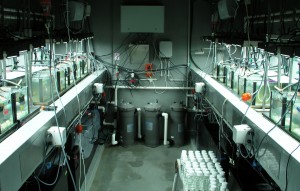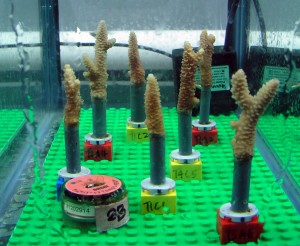NERP TE Project 5.2 - Combined water quality-climate effects on coral and other reef organisms (AIMS)
Project summary
This project will use complementary laboratory and field experiments to investigate the combined impacts of declining water quality (increased nutrients and sediments, and reduced light and salinity), increased sea temperature and ocean acidification on key reef species groups such as corals, foraminifera, crown-of-thorns starfish and rock-boring sea urchins.
Why this research is needed
Increasing sea temperatures, ocean acidification and reduced water quality from terrestrial run-off are likely to significantly alter marine and coastal ecosystems over the next few decades. To date, research investigating the impacts of these threats has considered each threat individually, but their interactions and cumulative impacts are as yet poorly understood and potentially more damaging than each threat in isolation. The outcomes of this research will demonstrate how management of local stressors such as reduced water quality is critical to maintaining the resilience of coral reefs to global stressors (increasing sea temperatures, ocean acidification), which are more difficult to manage.
Research-user focus
Knowledge from this project will contribute to Queensland and Australian Government policies to protect the Great Barrier Reef (GBR) from the effects of climate change and declines in water quality. The outcomes of this project will inform Reef Rescue, Reef Plan and facilitate management of the GBR by the Great Barrier Reef Marine Park Authority (GBRMPA).
Outcomes
- Quantification of changes in the tolerances of key reef species to global stressors (temperature increase, ocean acidification) due to increased local stressors, (increased nutrients, increased turbidity, decreased salinity).
- Greater knowledge of the individual and synergistic effects of declining water quality and global stressors on reproduction, larval development and settlement of key coral reef invertebrates (e.g. corals, echinoderms).
- Improved understanding of how changes in availability of carbonate in seawater as a result of ocean acidification will influence skeleton formation in calcifying reef organisms such as corals.
Reports, Publications and News
For more information see Project 5.2 'Experimental and field investigations of combined water quality and climate effects on corals and other reef organisms' on the NERP Tropical Ecosystems Hub site.
Images
Datasets

This dataset shows the measured response of early life history stages to different levels of nutrient enrichment and temperatures in experiments conducted in 2014-2015.
The data is presented as one Excel spreadsheet file. Each tab contains data from experiments (Exp. 1a,b; Exp 1c,d; Exp. 2; Exp 3) on different life stages exposed to the same conditions. Measured logged water quality (Nutrients) and temperature (Temperature) data taken during the experiment are also presented in different tabs.
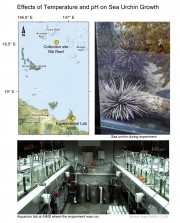
This experiment grew adult Echinometra sp. A sea urchins under four temperature and pH treatments 28 / 7.9, 28 / 8.1, 31 / 7.9, 31 / 8.1 (degrees C, pH) to investigate the interactive effects of warming and acidification on their physiology. These treatments were chosen to match those that may be experienced in the near-future (2100) due to climate change. Each treatment was replicated across 3 aquaria, each with 6 individuals for a total of 72 sea urchins.
Method:
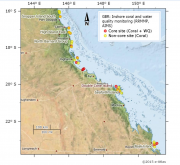
This dataset contains data on carbon chemistry on inshore reefs of the Great Barrier Reef (GBR). Main parameters measured were temperature, total alkalinity and dissolved inorganic carbon. The data was collected six times over two years (September 2011 - June 2012) covering a comprehensive latitudinal range.
The aim of this study was to investigate carbon chemistry on inshore reefs, and compare it to offshore reefs and historical data.
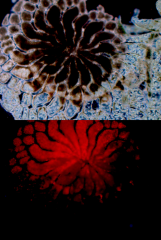
This dataset measures 5 effects of temperature and pH stressors (individual and combined) on tropical Foraminifera. The effects measured are: respiration, survivorship, growth, chl-a content and photochemistry. The study was conducted in 2011 and the data is provided as 5 single sheet spreadsheets.
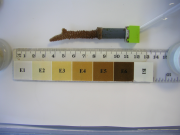
This dataset consists of one data file from a 16 day aquarium experiment manipulating pH and light level and measuring growth, photosynthesis, calcification and pigment content of Acropora millepora.
The aim of this study was to test the hypothesis that a combined effect of decreased pH and decreased light on physiological responses of the coral is larger than that of each stressor individually.
Method:






